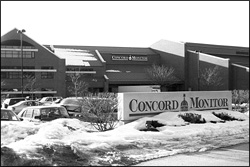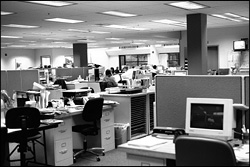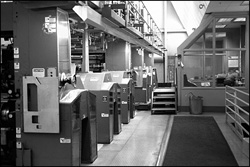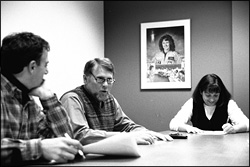



|
Interview with Mike Pride, editor of the Concord Monitor |
| A look at New Hampshire
news organizations...
Concord Monitor Copyright 1999 Eric M. Appleman/Democracy in Action. |
Concord
Monitor
Primary Coverage Back |
| Interview with Mike Pride, editor of
the Concord Monitor
"...everybody on our staff will be involved--we have a staff of around 15 reporters--and they'll all be involved in coving the primary..." [transcript below] Background
|
 |
 |
|
 |
 |
| Interview
Mike Pride spoke with DEMOCRACY IN ACTION on February 8, 1999 in his office at the Monitor. |
|
|
Looking forward to the next year, how is this primary going to be different from past primaries? MIKE
PRIDE: I think that we're starting pretty early. I think we have a lot
of candidates on the Republican side who seem to be going to get here early
and make a lot of visits early… I think because of the bunch up of the
primaries behind New Hampshire and also because this sense of you've got
to have a whole bunch of money early…you need to be very active early to
be considered seriously--I think those are the big factors.
|
|||
|
In terms of the Concord Monitor can you talk about your core reporting team and what your objectives for covering the primary are going to be? MIKE PRIDE: We have two political reporters, state house reporters, who are at this moment covering the big education issue in New Hampshire and also will be leading the primary coverage [Pamela M. Walsh and Sarah Koenig]. And as we always do everybody on our staff will be involved--we have a staff of around 15 reporters--and they'll all be involved in covering the primary. So what we've got to do is cover all of the local visits, all of the visits to Concord and the 40 towns around Concord, and we will go out of our area for events that we want to and we think are worth covering outside of our area. Like Elizabeth Dole's speech in Manchester tonight? MIKE PRIDE: Yeah like tonight. When Gore was here last week we went outside the area as well. Are you going to be doing man to man coverage at some point? MIKE
PRIDE: We will probably, usually in the summer before each primary, sometimes
earlier depending whether the field seems to take shape, we'll assign specific
reporters to specific candidates. This year it looks as though it may be
that we will have about the same number of staff members as there are candidates,
so that's always kind of a handy thing when it happens. [With] double-barreled
primaries [contested on the Democratic and Republican side] sometimes it
does happen.
|
TOP | ||
|
News organizations sometimes form partnerships to do polling, etc. Do you have any partnerships in mind? MIKE
PRIDE: We had a web site in '96, and we had a partnership with two other
papers in the state. We're also owned by--the company that owns us owns
the paper over in Lebanon, New Hampshire, the Valley News. We do
some teaming up--I guess I wouldn't say they're partnerships in terms of
our deciding that we want a story done over there so we assign somebody
over there to do something--but we offer our coverage to them, they offer
their coverage to us so it enhances our reach. And we may do some of that
this year; story-sharing more than anything else.
|
TOP | ||
|
I see the big full-page ad in your paper indicating that you've had your current web site up for a year, and it has had a million hits. It's probably the best primary coverage out there on the web right now, although there's going to be competition coming down the pike. Who makes the decision to commit the resources that you are to putting those stories up? MIKE PRIDE: I'm the editor, Tom Brown, the publisher, we have an online manager named Deke Bakke, Peter Bakke, and we have decided this is the way we're going to go. In addition our prototype for the web site was the '96 primary site. We hadn't done anything on the web up until that point. And so we made a decision that we'll just try this and see what happens. We tried it in a way--we tried to sell subscriptions--we had a plan; the business part of the plan didn't work, but the primary online part of it really did work. Now, obviously four years later the technology's much faster and there's a lot more capability, a lot more graphics capability. What we'll probably do is around summer, maybe mid-summer, we'll assign someone full time to be the primary Monitor editor throughout the campaign, through February, and maybe even have additional help. We're working on revenue generation; we don't know how that's going to work. We're not going to try to sell subscriptions this time out. …The business plans that we tried last time, they didn't work very well. But you are running banner ads? MIKE PRIDE: Yeah, we're running banner ads, and we may try some other things. I thought at one point if six months from now there was some kind of breakthrough that made video easier, maybe we could sell the television ads. Who knows? Who knows what may happen? I doubt that that would happen but we may try to sell the candidates some kind of advertising on the 'net. With banner ads from candidates, is there some ethical concern? MIKE
PRIDE: I don't think so. I guess my feeling about it is that people can
determine what's an ad and what's not. It's just like the newspaper; even
though they're at the top, you know it's an ad when you see it. To me that's
the distinction; as long as the reader can distinguish between an advertisement
and the news copy then I'm okay with it. And I think we have to try different
sorts of things to make the web page pay for itself too.
|
TOP | ||
|
If you had unlimited resources for political coverage are there some ambitious projects you'd like to do? MIKE PRIDE: We'll have ambitious projects; we always do. What have been some in the past? MIKE PRIDE: We've traveled actually quite a bit. We've traveled to the districts of the people running and done stories out there. We went to Arkansas when Clinton ran in '92. We try to pick--instead of-- The full-blown profiles always run the LAT wire so we take those from the L.A. Times and the Washington Post. But you might take a piece of a candidate's life like we did when Jack Kemp ran in '88, we happened to be doing a series of stories that year just looking at leadership and examples of leadership in the candidates' past. So we did a story on his quarterbacking days and talked to all the football players who played with him on the Buffalo Bills, and talked to them about leadership and the kind of field leader he was and just try to look at specific patches of a candidate's life. We are pretty ambitious. Actually I always end up feeling at the end of the primary campaign we've done maybe not everything we wanted to do but everything we could do. So if you gave me more people, then I could probably do more things, but we do everything we can with the people we have. And certainly in that last month that's all we're doing… So I don't have any big wish list. If I could do anything I would make all the big media go away. For a little longer. It's okay when they come in at the end, but they're getting here sooner and sooner, so if somebody, a candidate, shows up and there's 40 cameras around, it seems to me that they become a filter for things… The way the primary's supposed to work is a lot of one-to-one contact with the public. Not a filter --a blockade. MIKE
PRIDE: A blockade, exactly. Instead of a filter, a blockade. I think that
the extent to which that's put off, that's better for the process. The
longer it is before we start to see that, but I don't think that's going
to happen because it gets earlier all the time.
|
TOP | ||
|
The political terrain, looking at it now versus '96 versus '92--how different is it? For example, now there is a Democratic governor and the economy is doing well. MIKE
PRIDE: I think New Hampshire's still a Republican state even though we
also have a Democratic Senate now, which is something that we hadn't had
in 80 years until this past election. It's still a Republican state I think.
I think the problem the Republicans have had holding their power in this
state is the extent to which the right wing has pulled them over, and people
don't want to hear that stuff very much I don't think. For the presidential
primary, I would say that New Hampshire will do what it has always done
and that's look for the pragmatic centrist--on both sides of the primary.
|
TOP | ||
|
What does it take for a presidential candidate to do well in New Hampshire? MIKE PRIDE: What you're going to see this time I think, is you're going to have a lot of people trying to follow the Clinton model, where you do a lot of town meeting type events, where you have this one-on-one with people. You saw Gore do that here last week and he can't do it. I saw it on C-SPAN and our coverage in the paper kind of indicated the same thing. He's not able to do what Clinton did. So
that always kind of becomes the model. When Jimmy Carter won by coming
very, very early, then everybody thought, well the way to do it is to come
very, very early. But Rubin Askew showed up early, and he just didn't have
the heft as a candidate to make it through. So it is a combination of things,
and I think what happened last time is often…sets to some degree what people
think will work this time. Maybe it will, maybe it won't; we have to wait
and see.
|
TOP | ||
|
And how about your paper and the way it does business, and technology improvements, as compared to '96? MIKE PRIDE: The web is the big difference; Internet is the big difference. I don't think we had beepers four years ago. There's all kinds of things that we have now that we didn't have then. We don't have digital photography, but we're just using a lot more color photography in the newspaper. …Our technology in terms of putting out the paper is much improved. We do a lot of sending pictures. If we decide we're not going to cover a presidential event in Lebanon or Hanover and something big happens there, and we're not on the ground there, we can get e-mail photographs from our sister newspaper… All kinds of technological things that make it easier for us to do our job.
MIKE
PRIDE: We probably will. We'll probably put everything up. We put our local
stories all up. We may even put some stuff up that we don't put in the
paper. Last time we set out to do that and we did quite a bit of it, and
I guess we haven't really had the planning meeting that says here's what
we're going to do this time. But one of the things we'll look at probably
is in '96 what did people use, what was actually used? Did they use for
example the tables on the results of all the New Hampshire primaries, did
they use the maps we did or locator things we did on particular towns and
their characteristics? We put a lot of stuff in there last time and we'll
have to look back and see what kind of use those things got to decide whether
we're going to do all that again. Also how hard it would be to re-create
it. Maybe it's still there. I don't know; I just haven't looked at it in
a long time.
|
TOP | ||
|
You mentioned a planning meeting. For a lot of news organizations that's a first step; when are you going to do that? MIKE PRIDE: Probably not 'til after--April 1st is the deadline for solving this school issue in the state. Until that happens we probably won't really focus that hard on the primary. Deke Bakke, who is the online manager, created the Primary Monitor part of the web page two or three months ago maybe longer, and so we're still doing the same thing. We're putting it all up; we just haven't quite organized it, expanded it and decided exactly-- And
I'll tell you one of the things that was a big success in 1996, and we'll
do it again. We had the editor of that section every day would do a kind
of a saucy agenda of what happened at that day, kind of a briefing page.
So if you'd called up that page you could find out...what all the candidates
did in the state, and it was written with an edge. And it would link to
the full stories and that kind of stuff. And I think that that's something,
particularly at a newspaper and having an editor whose job it is to do
that, I'm sure we'll do that again. We also used that in the paper; we
used that agenda in the paper, not every day but when we had space for
it, and it was kind of a "refer" to our web page as well.
|
TOP | ||
|
Your closing words of advice to any candidates coming up here? MIKE
PRIDE: They've got to schedule events where they hit the ground and talk
to people--that's what it's all about really. Getting into venues where
you're actually having a conversation with voters about what it is you
intend to do and what they expect of you. I don't think everybody can do
it as glibly as Bill Clinton did, but that's the way you're going to have
to run a campaign.
|
TOP | ||
| Copyright 1999 Eric M. Appleman/Democracy in Action |